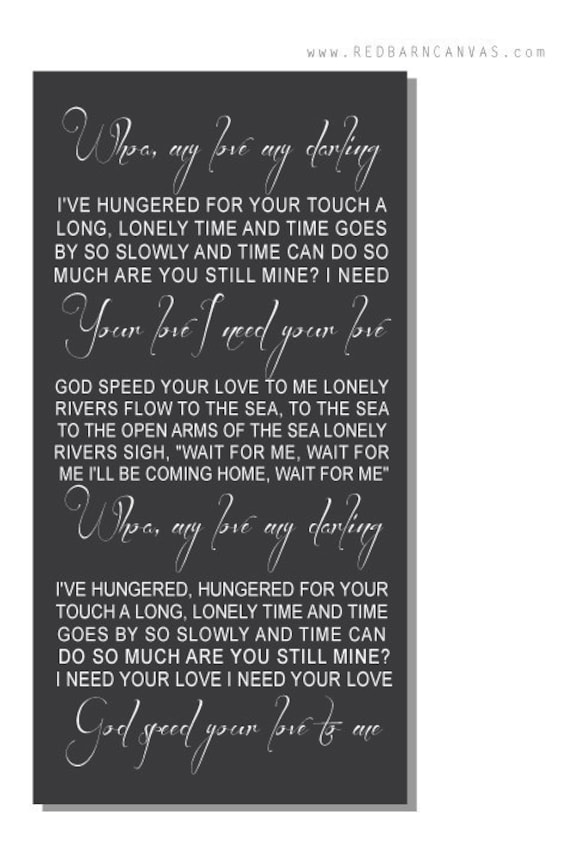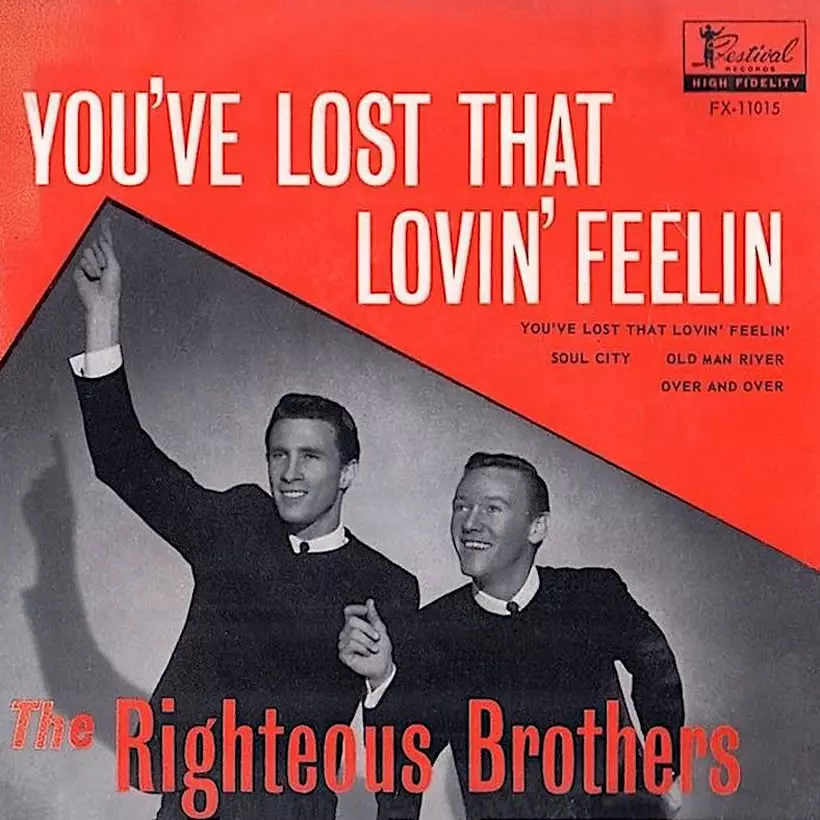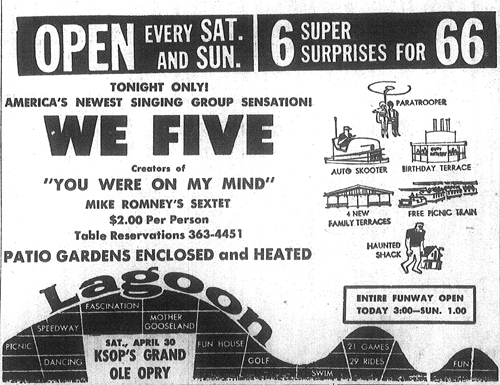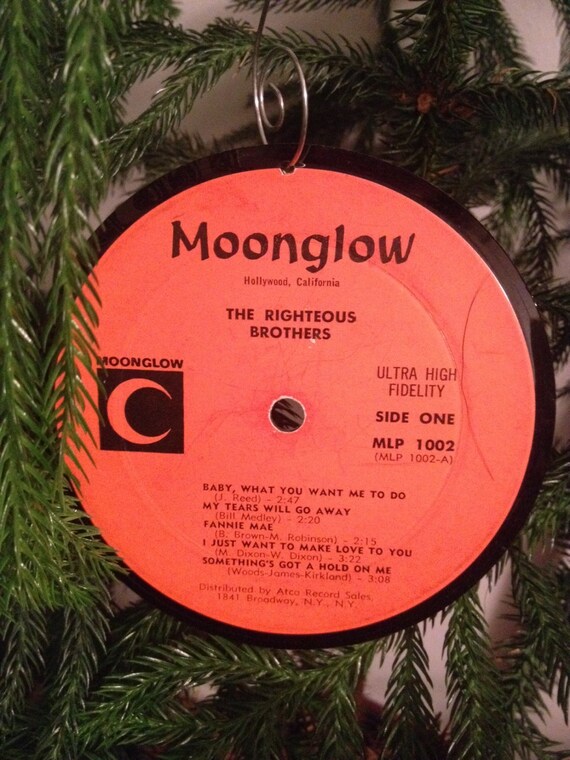The appearance of "You've Lost That Lovin' Feeling" on the soundtrack to the 1986 film Top Gun was but one sign of the Brothers' long-lasting appeal. The pair re-united to perform together on a semi-regular basis through the '80s, most notably on a 20th Anniversary reunion tour in 1982. Medley and Hatfield also launched The Hop, an Orange Country nightclub featuring performers from the '50s and '60s. Re-immerging a solo artist, Bill Medley enjoyed another smash hit with his 1987, chart topping single "(I've Had) The Time Of My Life", a duet with Jennifer Warnes from the Dirty Dancing soundtrack album.
When "Unchained Melody" became one of 1990's biggest hits after its inclusion in the movie Ghost, no one was more surprised than Medley and Hatfield. "I feel that the popularity of the song is just a miracle", Hatfield told the Chicago Sun-Times. "I've always loved it, but never expected the public's reaction to it to be quite this feverish and strong." As they performed together in 1998, the Brothers found that "Unchained Melody", featuring Hatfield's lead vocal, drew ecstatic response. Combined with the air play that the original version of the song was receiving, it seemed the perfect time to reunite The Righteous Brothers as a recording act once again. They went into the studio together for the first time since 1974, with Medley producing.
The sessions, which resulted in the tracks heard on their album "Reunion", showed that Medley and Hatfield's powers as singers remained unique and undimmed. The new century saw a new generation of fans discover the magic of the Righteous Brothers. "Considering how long we've been in the business, this is a real treat," said Medley.
They weren't really brothers, but Bill Medley and Bobby Hatfield were most definitely righteous, defining and perhaps even inspiring the term "blue-eyed Soul" in the mid-'60s. Bobby Hatfield was born on August 10th, 1940 in Beaver Dam, Wisconsin, and Bill Medley was born on September 19th, the same year in Santa Ana, California. When Medley and Hatfield combined forces in 1962, they emerged from regional groups The Paramours and The Variations. In fact, they kept The Paramours billing for their first single. Thinking of a new name, the pair remembered the night they sang in front of a group of U.S.
Even on the Moonglow recordings, Bill Medley acted as producer and principal songwriter, taking the low parts with his smoky baritone, Hatfield taking the higher tenor and falsetto lines. The pair was spotted by British producer Jack Good, who had made his way to Los Angeles and was a producer with the popular Rock TV show Shindig!. They appeared on the program and were signed to the Philles label by Phil Spector, who had already had a run of success with The Crystals, The Paris Sisters, Curtis Lee, The Ronettes, and others. They were given a song that Spector had written with Barry Mann and Cynthia Weil. Hatfield and Medley recorded the tune and it entered the charts in late 1964.
"You've Lost That Lovin' Feelin'" was a smash success. It topped the charts in the U.S. and the UK and to this day is one of the most requested songs of the era. At nearly four minutes, the song was pushing the limits of what could be played on AM radio in the mid-'60s, and some listeners thought they were hearing a 45 single played at 33 rpm due to Medley's low, blurry lead vocal.
No matter, the song had a power that couldn't be denied. The Righteous Brothers continued to appear on Shindig! They were now international stars, and followed up their hit with another that reached the Top Ten, "Just Once In My Life".
From 1956 to 1961, the Coasters released a string of classic singles that reflected the life of the American teenager with keen wit and hot, rocking harmonies. Invariably those songs were written, produced and arranged by the duo of Jerry Leiber and Mike Stoller. The union of a black vocal group with two Jewish songwriters was one of the most propitious in rock history. Leiber and Stoller's witty, street-smart "playlets" were sung with sly, clowning humor by the Coasters and accompanied by the hot, honking "yakety sax" of King Curtis.
The Coasters' parlayed their R&B roots into rock and roll hits by delivering Leiber and Stoller's serio-comic tunes in an uptempo doo-wop style. Beneath the humor the songs often made incisive points about American culture for those willing to dig a little deeper. Cher has always been a master of invention and reinvention. But more than that, Cher is that rare creature — a celebrity whose fame transcends her artistic and commercial accomplishments and in some way becomes her greatest pop culture achievement.
The majority of Israeli boy names like David or Daniel are either Biblical boy names or Hebrew boys' names. As a parent with a penchant for ancient and religious names, you might be searching for baby names which are not only popular but also, make your child stand out. Here's the list of all the trendy Israeli baby boy names. These members had played together since 1959, first as The Blue Velvets, then as The Golliwogs. Their musical style encompassed roots rock, swamp rock, and blues rock. The band performed at the 1969 Woodstock Festival in Upstate New York.
The best known version of "Unchained Melody" was recorded by The Righteous Brothers and produced byPhil Spectorin 1965 as the 'B' side of the single featuring the song, "Hung On You". Although the version was credited to The Righteous Brothers, it was actually performed as a solo by Righteous BrotherBobby Hatfield, who later recorded other versions credited solely to him. This recording climbed to #4 on theBillboard Hot 100chart in 1965 and reached #14 in the UK in 1965.
When the re-release became a hit, the label that now owned the distribution rights underestimated it's popularity and the few copies that record stores had sold out quickly, with back orders that went into several weeks. Meanwhile the Righteous Brothers, who weren't making a dime off of the original any more, decided to re-record the song and release it on Curb, Bill Medley's current label. Since the charts are based on radio airplay and record sales , both versions landed in the Top 20 at the same time.
If these two figures had been added together, a song two decades old would have been the #1 song of the year. In the UK, that was exactly the case, as the song made #1 and was the biggest-selling single of 1990. Two different versions of the song were released to coincide with the movie's release; an orchestral version and one with the lyrics performed by Al Hibbler.
Hibbler's version of the song hit the number one position on the R&B charts in 1955, as did a version by Roy Hamilton. Another version from June Valli reached the #29 spot on Billboard's Hot 100 Singles list in May 1955. The song was also recorded by Harry Belafonte later that same year. Mysteries July 9, 2016 Why are Americans obsessed with skin color? Why do they insist on defining people by this particular physical trait, and then proceed to separate them?
You can't decide which music genres people should be inspired by based on how they look like . They're all musicians and they get inspired by music. Also, the vast majority of artists, regardless of skin color, don't get the support and recognition they need, while only a few black artists and a few white ones enjoy such privilege. If someone is denied opportunities due to prejudice of course this has to be discussed, but this doesn't make it sensible to decide that white artists can only be inspired by people of the same color.
There's no innate difference between black and white people, so this whole mentality of black this and white that makes no sense. Most people don't realize that the notion of "blue eyed" soul was created to even the playing field between black and white singers. That's what White America does when black people are better at something; they try to create their own version of it so that it appeals to a larger white audience.
While filming Animal House in Eugene, Oregon, John met and studied at the feet of bluesman Curtis Salgado, who awakened in the actor a love for America's roots music—a love already shared by SNL partner Dan Aykroyd. It was John and Dan's shared adoration for blues and soul music that sparked the birth of the Blues Brothers. He and Aykroyd first appeared as Joliet Jake and Elwood Blues—a pair of white soul men in their now trademark ensemble––as a warm-up act before the telecasts of Saturday Night Live, eventually making their debut as the featured musical guest.
The release of their #1 chart-topping live album A Briefcase Full of Blues helped propel John to mega-stardom. The Du Droppers, like so many of the pioneer R & B vocal groups that came to prominence in the late 40s and early 50s had their genesis in the field of gospel music. The original members of the Du Droppers were Junior Ginyard on lead, Willie and Harvey Ray on tenor and baritone, and Eddie Hashow on bass . In prior years different members of the group had been part of such gospel groups as the Royal Harmony Singers, The Dixie-Aires, The Jubilaires, and the Southwest Jubilee Group. The newly named Du Droppers worked on some R & B material and soon auditioned for record producer Bobby Robinson and radio d.j. Joel Turnero owners of the Harlem based Red Robin label.
The first record released by the group in December of 1952 was that special niche of the early years of Rhythm & Blues, the "answer" record. In this case the tune was "Can't Do Sixty No More" answering the Dominos massive hit of "Sixty Minute Man". The flip side of this first outing by the group was "Chain Me Baby" on Red Robin #108. Playing off the long popularity of the Dominos hit the Du Droppers got instant "name" recognition and publicity that go along with airplay and demand by the public for the record. The band's history can be roughly divided into three eras. From 1969 to 1975 they featured lead vocalist Tom Johnston and featured a mainstream rock and roll sound with elements of folk, country and R&B.
Johnston quit the group in 1975, and was replaced with Michael McDonald whose interest in soul music changed the sound of the band until they broke up in 1982. The Doobie Brothers were inducted into the Vocal Group Hall of Fame in 2004. Chicago is an American rock band formed in 1967 in Chicago, Illinois. The self-described "rock and roll band with horns" began as a politically charged, sometimes experimental, rock band and later moved to a predominantly softer sound, generating several hit ballads.
The group had a steady stream of hits throughout the 1970s and 1980s. They have sold over 40 million units in the U.S., with 23 gold, 18 platinum, and 8 multi-platinum albums. In 1995, the song was performed byRobson GreenandJerome Flynnin the UK drama seriesSoldier Soldier.
They subsequently released a Righteous Brothers-type version as a single, which quickly reached #1 in the UK, becoming one of the country's all time biggest-selling records, and has sold 1.86 million copies as of November 2012. Les Baxter released an instrumental version which reached #1. However, it was the July 1965 version byThe Righteous Brothersthat became ajukeboxstandard for the late 20th century, achieving a second round of great popularity when it was featured in the 1990 blockbuster filmGhost. Of course, journalists need these terms more than anyone, in a sense – a recognisable genre name is powerful shorthand. As the longtime bible of the American music industry, thanks to its trendsetting album and single charts, Billboard has played a significant role in disseminating musical titles.
Easy listening, for instance, was coined in the 17 July 1961 edition (not, sadly, included on the magazine's Google Books archive, though every other 1961 issue is). Rhythm & blues came to be in 1947, when Jerry Wexler, then a Billboard editor, began using it to denote the kind of postwar black pop that he went on to pioneer with Atlantic Records. Rhythm & blues became a chart name in the 25 June 1949 issue, replacing the previous issue's "Race Records". Bobby Hatfield loved the Roy Hamilton version of this song, and was singing it in clubs before he met Bill Medley. When they started recording as the Righteous Brothers, they usually included one solo each on each of their albums. Bobby chose this song for the "Just Once in My Life" LP. Because it was never intended to be released as a single, Bill Medley produced it , and it was released as the intended "throwaway" B-side to the Spector-produced "Hung on You".
However, radio stations flipped it over to play "Unchained Melody", which infuriated Spector. Spector attempted to convince radio stations to play "Hung on You" instead, but it ws too late--"Unchained Melody" had become an accidental smash hit. Bill Medley has since said that Bobby "just killed it," recording the song in about 30 minutes. Medley sings it in tribute to Bobby at his shows now, complete with a video slide show.
The song saw a massive resurgence in popularity again in 1990 when it was used as the love theme in the movie Ghost, featuring Patrick Swayze and Demi Moore. The Righteous Brothers wanted to re-release the song because of the renewed interest caused by the movie. Due to licensing issues, The Righteous Brothers were forced to record a new version of the song, this time on Curb records. Both the original version and the re-recorded version actually appeared on The Billboard Hot 100 at the same time, making The Rigteous Brothers the very first group to have two versions of the same song charting in the top 20 at the same time. It's a bit of a mystery as to why the Righteous Brothers never came close to duplicating that success during the rest of their tenure at Verve. They would only have a couple of other Top 40 hits in the 1960s with "He" (#18) and "Go Ahead and Cry" (#30), both in 1966, even with the aid of occasional compositions by the formidable Goffin-King team.
David D'Or is a renowned Israeli composer, singer, and songwriter. David is also one of the most popular boys' names among Jewish boys' baby names as it has Biblical connotations. From what I have read/researched this is a song about a man in prison who is longing for his lover and hoping she is still in love and waiting for him. But I do think the feelings and emotions evoked can be applicable to many situations and relationships. This was the song I grew up hearing every night of the summer at a family camp in MI.
Every night, all summer long, and it never, ever got old. Such a romantic song, the best one to slow dance to. I have always appreciated how this song had layers of meaning and how it can mean so many things to different people, and is relatable in many levels. These high priced clubs are profiting from creating a euphoric environment that allows affluent white people to live in a rap fantasy. They're playing music that has gang and drug connotations to it; made by artists that largely come from poverty stricken, inner city communities. There's nothing about the music that middle-upper class white people can relate to; yet they love it.
When John was six, his family moved to the western suburb of Wheaton, Illinois, where two more sons, Jim , and Billy where born. The small town of Wheaton was a stark contrast to the city life John had known. The swarthy Albanian immigrant son, he became the perfect all-American boy during his high school years, quite unlike his later wildman public persona. Co-captain of the Wheaton Central High School football team, he was an All State nominated line-backer and was elected homecoming king his senior year. He also developed an interest in comedy and acting while in high school, and appeared in the high school variety show and numerous plays, including a four-person drama which won third place in state competition.
During the summer before his senior year, John met and fell in love with his future wife, Judy Jacklin. Earth, Wind & Fire is an American band that has spanned the musical genres of R&B, soul, funk, jazz, disco, pop, rock, Latin and African. They are one of the most successful bands of all time. Rolling Stone Magazine described them as "innovative, precise yet sensual, calculated yet galvanizing" and declared that the band "changed the sound of black pop".
Dion Francis DiMucci , better known mononymously as Dion, is an American singer, songwriter whose work has incorporated elements of doo-wop, rock and R&B styles-and, most recently, straight blues. He was one of the most popular American rock and roll performers of the pre-British Invasion era. He had 39 Top 40 hits in the late 1950s and early 1960s as a solo performer, with the Belmonts or with the Del Satins.

























